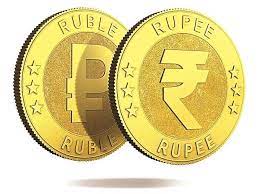India Contributes to Alternative Payment Mechanism for Russia

All Global Research articles can be read in 51 languages by activating the “Translate Website” drop down menu on the top banner of our home page (Desktop version).
To receive Global Research’s Daily Newsletter (selected articles), click here.
Visit and follow us on Instagram, Twitter and Facebook. Feel free to repost and share widely Global Research articles.
***
The war in Ukraine has focussed attention on Russia’s global exports as sanctions on the country have led to sharp rises in various commodity prices. As Russia is a key supplier of not just oil and gas, but also wheat, metals and fertilizers, the problem is further aggravated due to Russia’s exclusion from the Society for Worldwide Interbank Financial Telecommunication (SWIFT) mechanism, which means that payments for trade with Russia are not permissible in dollars.
Indian exporters have payments of around $400-500 million pending in Russia due to the war in Ukraine and the subsequent economic ban on the country and its exclusion from the SWIFT mechanism by the western powers. In 10 months of FY22, India’s exports to Russia totalled $2.85 billion against $7.90 billion of imports, according to Bank of Baroda Economic Research data.
Discussions on a Rupee-Ruble trade mechanism is an inevitability after Russia’s exclusion from SWIFT. As economic sanctions against Russia are used as a weapon of war by the western powers, the countries trading with the Eurasian Giant need to have an alternative mechanism for payments. Some experts have suggested to identify an Indian bank in which Russia would deposit rubles, while India will deposit rupees. Russia would use all the rupees it gets from Indian importers to buy goods; Indian exporters would use the rubles to pay for imports from Russia.
This is especially crucial for India as sanctions on Russia have adverse effects on Indo-Russian trade. Amidst the uncertainties, there has been a substantial depreciation in the Rupee (Rs. 77/Dollar), making Indian imports more expensive. However, India’s non-weapon non-oil trade with Russia is miniscule, and so the effect would be minimal.
None-the-less, the exclusion of Russia from SWIFT as part of sanctions meant that millions of dollars in payments for Indian tea, steel, chemicals and pharmaceuticals have been held up. Tea exporters say that the necessity of rupee payment has come if the dollar payment has become impossible. This is significant when considering that India is the largest exporter of tea to Russia, amounting to 43-45 million kilograms.
The rupee-ruble trade mechanism will likely open an alternative channel for the Global South to continue trading with Russia. This would be possible because many Russian banks are already present in India. Large Russian banks with a presence in India include VTB, Sberbank and Gazprombank. Russia’s state-owned development bank VEB is also engaged in such trade.
VEB and the Reserve Bank of India are in the process of finalising an alternative transaction platform to facilitate bilateral trade. Apart from facilitating India-Russia bilateral trade, the Rupee-Ruble platform might facilitate the Global South’s alternative financial transactions with Russia.
Increasing economic sanctions have created problems in other currency zones as well, particularly Iran, demonstrating why many countries are entering into currency swap deals to continue trading without depending on the dollar.
The post-World War western dominated financial architecture is a skewed global financial system. In view of this, the Rupee-Ruble mechanism may open an era of trade without dollars. The global financial system should not be leveraged as a weapon of war by any group of countries, otherwise it would lose trust.
The biggest problem for developing countries arises from the fact that Russia exports significant quantities of grains and has imposed a halt on grain shipments to its neighbours in the Eurasian Economic Union until the end of August. This is to “maintain stability on the Russian market”. The two largest buyers of wheat from Russia, Egypt and Turkey, have seen disruptions in supply due to closure of Black Sea ports as the war in Ukraine wages on. As Russia and Ukraine both supply one-third of the total global supplies of wheat, the disruption in supply has pushed prices up.
What the West has not considered though is that the problem might be complicated further due to Russia’s exclusion from the SWIFT mechanism. In such cases, Rupee-Ruble trade will be another step towards the de-dollarization of the global economy as countries seek safety from potential sanctions and economic attacks from the West. As the Global South suffers from a war being waged in far off eastern Europe, it is inevitable that they will explore an alternative payment system as they do not want to lose their economic relations with Russia and will use the Indian model as a guiding principle.
*
Note to readers: Please click the share buttons above or below. Follow us on Instagram, Twitter and Facebook. Feel free to repost and share widely Global Research articles.
Paul Antonopoulos is an independent geopolitical analyst.
Featured image is from business-standard.com/

